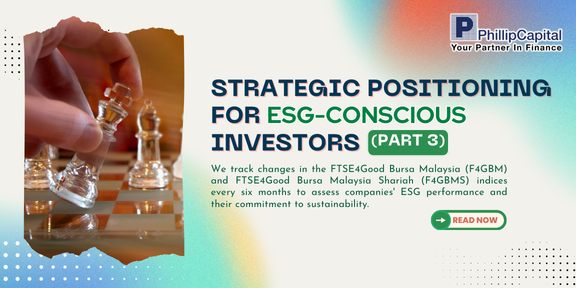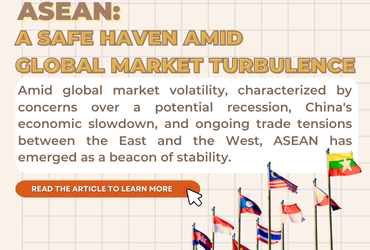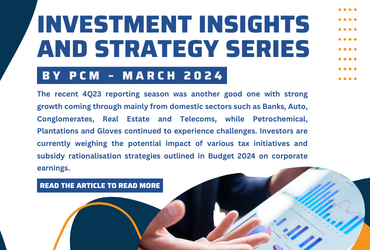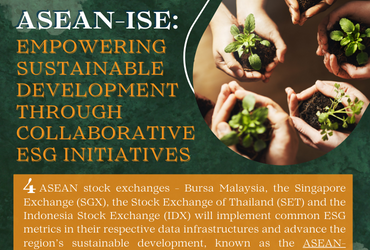
We regularly track the changes in the constituents of the FTSE4Good Bursa Malaysia (F4GBM) and FTSE4Good Bursa Malaysia Shariah (F4GBMS) indices every six months to evaluate the performance of companies that meet strict environmental, social, and governance (ESG) criteria. This bi-annual review enables us to monitor how well these companies align with sustainable investing principles and their ongoing commitment to responsible practices. By doing so, we gain valuable insights into the broader market’s adherence to sustainability and ethical business standards.
Below is a summary of our previous analysis.
For the December 2024 review period, there are 28 inclusions and 1 exclusion from the
F4GBM Index, bringing its total number of constituents to 147. Meanwhile, the F4GBMS Index will see 22 inclusions and 2 exclusions, bringing the index’s constituent count to 115.
Figure 1: Summary of changes in the constituents of the F4GBM index.

Source: Bursa Malaysia, 12 December 2024, link
Figure 2: Summary of changes in the constituents of the F4GBMS index.

Source: Bursa Malaysia, 12 December 2024, link
The table below outlines the sector allocations within both indices and highlights the most recent changes:

Source: Bursa Malaysia, compiled by PCM
Some observations:
- The Construction, Healthcare, Industrial, and Property sectors saw the greatest increase in inclusion in both the F4GBM and F4GBMS indices, both in absolute numbers and relative weight within the indices. We commend these companies for enhancing their practices to meet the criteria for inclusion in ESG-focused indices. A key factor driving the success of the Construction and Property sectors is the growth of data centers. These facilities contribute to ESG goals by improving energy efficiency, reducing carbon emissions, and promoting sustainable resource management. Additionally, significant progress from the National Energy Transition Roadmap (NETR) has further supported this growth.
- The Financial, Energy, and Technology sectors have experienced a slight decrease in their relative weight within the F4GBM index, as companies from sectors such as Construction, Healthcare, Industrial, and Property are becoming more prominent. However, in terms of absolute numbers, this remains largely unchanged. This shift reflects a positive trend toward broader sector representation in the index. The inclusion of these sectors could enhance diversity and offer investors a wider range of ESG-conscious investment opportunities
- In the December 2024 review, the top 5 sectors in the F4GBM Index are Consumer (16%), Industrial (13%), Finance (12%), Property (12%), and Technology (11%). In the F4GBMS Index, the leading sectors are Consumer (16%), Industrial (15%), Technology (14%), Property (12%), and Energy (10%). The F4GBMS Index has less exposure to the Financial sector compared to the F4GBM Index, primarily because most Financial stocks are non-Shariah compliant.
Looking ahead, we anticipate that ESG-conscious investors will likely continue to focus on the following sectors in Malaysia:
- Financial Services
The Financial Services sector (including Banks) in Malaysia plays a crucial role in promoting good governance practices and ethical behaviour. Transparent financial reporting, responsible lending, and ethical investment practices contribute to the governance and social aspects of ESG. Financial institutions also have the opportunity to support sustainable development through responsible financing and investment decisions.
- Technology
Many tech companies in Malaysia earn strong ESG ratings from investor research and ratings firms, mainly due to their low-emissions footprint. In addition, the tech sector is strategically aligned with emerging ESG investment trends, including Electric Vehicles, Semiconductors, Artificial Intelligence, Biotechnology, and other related themes.
- Consumer Products & Services
Companies in the Consumer Products & Services sectors that prioritise sustainable sourcing, ethical production, and fair labour practices demonstrate a commitment to ESG principles. Efforts to reduce waste, promote recycling, and offer environmentally friendly products contribute to the environmental aspect of ESG.
- Industrial Products & Services
Certain industrial companies have exposure to the Technology/Semiconductor industries, which stand to benefit from the rising trends mentioned earlier. Additionally, some metal/chemical companies, such as PMETAL and PCHEM, are among the constituents of the F4GBM and F4GBMS indices. PMETAL is seen as an indirect beneficiary of the global push toward decarbonization, as aluminum is the preferred metal in the EV and solar photovoltaic (PV) sectors. PCHEM has an established framework and internal policies to drive its ESG commitments, with sustainability KPIs incorporated into top management performance appraisals.
- Property
In the December 2024 review, we observe an increased inclusion of property companies, particularly those involved in data centers. Additionally, many of these property projects are actively supporting sustainable development, such as reducing carbon emissions, incorporating EV charging stations, installing water-efficient fixtures, and using eco-friendly materials. Furthermore, some publicly listed companies focus on affordable housing, which aligns positively with the social aspect of ESG principles.
- Energy
In the June 2024 review, four energy companies were added to the F4GBM and F4GBMS indices: Carimin Petroleum, Icon Offshore, Petron Malaysia Refining & Marketing, and Wasco. These companies have adopted sustainability policies aligned with ESG goals, prioritizing efforts that contribute significantly to achieving the United Nations Sustainable Development Goals. The number remained mostly unchanged in the December 2024 review, except for Bumi Armada, which became Shariah-compliant and was subsequently included in the F4GBMS Index. We anticipate the inclusion of more ESG-focused companies in the Energy sector moving forward.
Identify investment opportunities – Phillip Managed Account for Retirement (PMART) and Phillip Managed Account (PMA) ESG
PMART and PMA ESG is a discretionary portfolio that invests in stocks with high ESG ratings from the F4GBM and F4GBMS Indices. There are both conventional and Shariah options available. PMART and PMA ESG is suitable for investors who want to optimise the risk-adjusted return by constructing a diverse sustainable portfolio of ESG companies. Exhibits 1-4 show the performance for PMART ESG Conventional and Shariah.

Source: PCM, 31 Dec 2024, link
Please click on the link to learn more or email us at cse.my@phillipcapital.com.my if you require any further information.
Disclaimer:
The information contained herein does not constitute an offer, invitation or solicitation to invest in Phillip Capital Management Sdn Bhd (“PCM”). This article has been reviewed and endorsed by the Executive Director (ED) of PCM. This article has not been reviewed by The Securities Commission Malaysia (SC). No part of this document may be circulated or reproduced without prior permission of PCM. This is not a collective investment scheme / unit trust fund. Any investment product or service offered by PCM is not obligations of, deposits in or guaranteed by PCM. Past performance is not necessarily indicative of future returns. Investments are subject to investment risks, including the possible loss of the principal amount invested. Investors should note that the value of the investment may rise as well as decline. If investors are in any doubt about any feature or nature of the investment, they should consult PCM to obtain further information including on the fees and charges involved before investing or seek other professional advice for their specific investment needs or financial situations. Whilst we have taken all reasonable care to ensure that the information contained in this publication is accurate, it does not guarantee the accuracy or completeness of this publication. Any information, opinion and views contained herein are subject to change without notice. We have not given any consideration to and have not made any investigation on your investment objectives, financial situation or your particular needs. Accordingly, no warranty whatsoever is given and no liability whatsoever is accepted for any loss arising whether directly or indirectly as a result of any persons acting on such information and advice.






